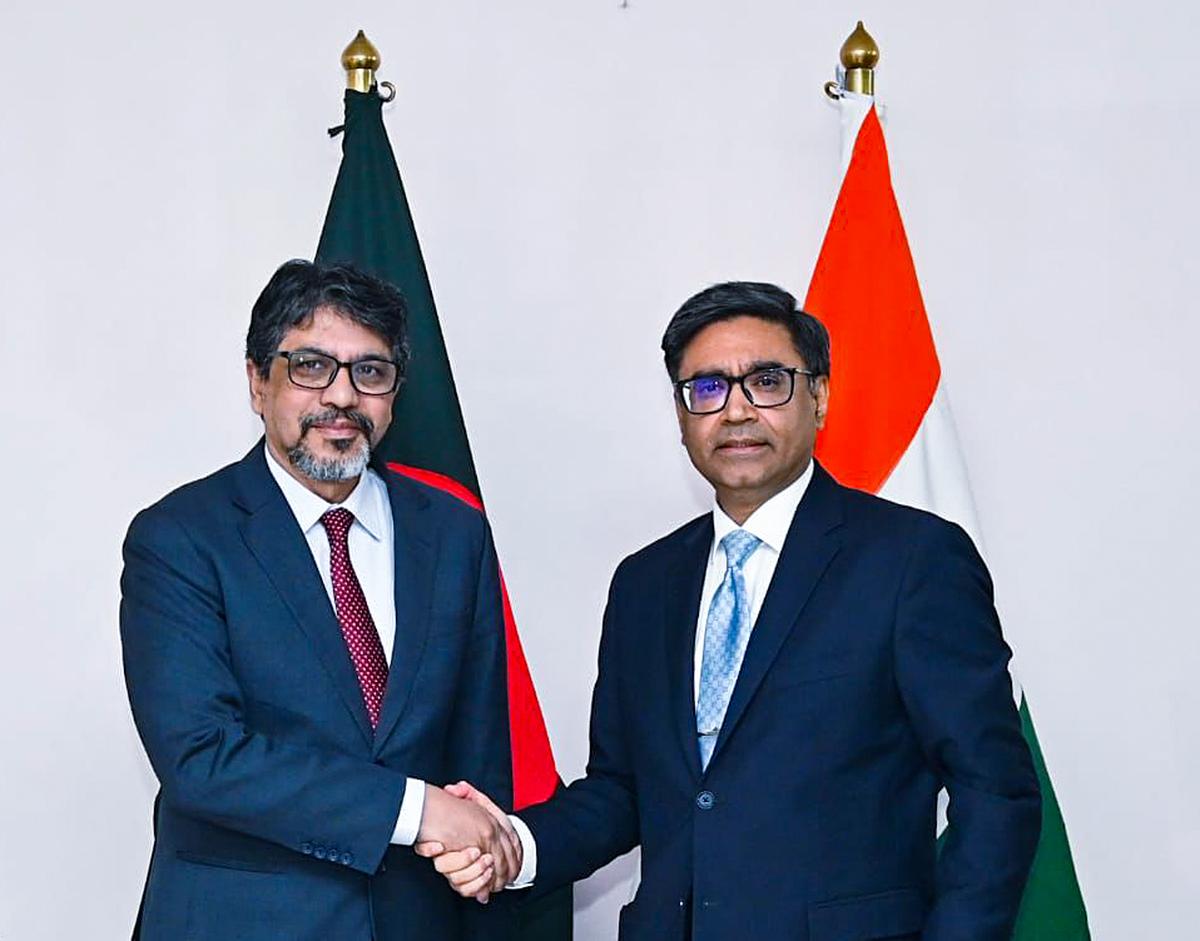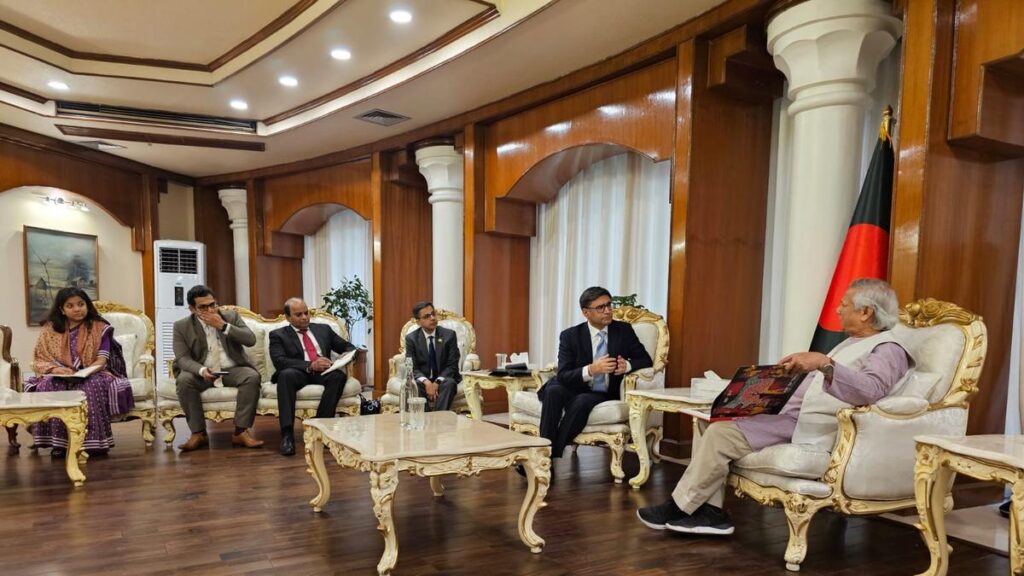Foreign Secretary Vikram Misri on Monday (December 9, 2024) conveyed India’s “concerns” over the safety and security of minorities in Bangladesh and urged the interim government there to follow a “constructive approach”.
Mr. Misri made the remarks while holding a Foreign Office Consultation with his Bangladeshi counterpart, Mohammad Jashim Uddin, in Dhaka. He also called on Chief Adviser Muhammad Yunus, who urged India to “join his initiative to revive the SAARC (South Asian Association for Regional Cooperation)”.
Mr. Misri is the first high-ranking Indian official to visit the neighbouring country after the student-people uprising forced Prime Minister Sheikh Hasina to flee to India in August. Bilateral relations have nosedived since the interim government took charge.
Responding to Mr. Misri’s remarks, Mr. Jashim Uddin expressed Dhaka’s concerns over the recent breach of security at the Assistant High Commission of Bangladesh in Agartala and asserted that the safety of the minorities was an “internal matter of Bangladesh”.


While meeting Mr. Misri, Mr. Yunus said students, workers, and the people came together to change the political system in Bangladesh. “Our job is to keep their dreams alive. It is a new Bangladesh,” he said.
“I have underlined today [Monday] India’s desire to work closely with the interim Government of Bangladesh authorities. At the same time, we also had the opportunity to discuss certain recent developments and issues, and I conveyed our concerns, including those related to the safety and welfare of minorities,” Mr. Misri said in a statement at the end of the consultation with the Bangladesh Foreign Secretary.


Foreign Secretary Vikram Misri (right) meets his Bangladeshi counterpart Mohammad Jashim Uddin in Dhaka, Bangladesh on December 9, 2024.
| Photo Credit:
ANI
Addressing the Indian side, Mr. Jashim Uddin conveyed concerns of the interim government regarding the December 2 “violent incident on the premises of Assistant High Commission of Bangladesh in Agartala”.
“On the issues of minorities, he emphasised that Bangladesh government is committed to ensuring the safety and security of the people of Bangladesh irrespective of their faiths, religions and ethnicities and that it is an internal matter of Bangladesh,” the Ministry of Foreign Affairs said in a statement.
He further called for the early conclusion of the Teesta waters sharing agreement and starting of discussion for the renewal of the Ganga Water Sharing Treaty of 1996.
Mr. Misri’s visit to the Bangladeshi capital came a fortnight after the Dhaka Metropolitan Police arrested Chinmoy Krishna Das, leader of the Bangladesh Sommilito Sanatani Jagaran Jote, a Hindu religious organisation that has been fighting for the rights of minority groups in Bangladesh, in a sedition case.
Mr. Das was subsequently denied bail and his trial has now been postponed to the first week of January. Reports suggest that lawyers are being prevented from representing him.
The Foreign Office Consultation is significant as it comes four months after the massive student-led protests that led to the fall of the Hasina government. During the last phase of the uprising, the protesters also destroyed a number of government properties, including the Indira Gandhi Cultural Centre in the posh Dhanmondi neighbourhood as well as a few temples.
Mr. Misri, who was accompanied by Indian High Commissioner Pranay Verma and other officials, said, “We also discussed some regrettable incidents of attacks on cultural, religious and diplomatic properties.”
Apart from the arrest of Mr. Das, the India-Bangladesh relations have been caught in a turbulent phase over the presence of Ms. Hasina in New Delhi. The former Prime Minister has issued two statements online over the past fortnight attacking the interim government, drawing criticism from Mr. Yunus and his team. India has maintained a studied silence on the matter. Mr. Yunus raised the issue with Mr. Misri and said, “Our people are concerned because she is making many statements from there. It creates tensions.”
Protests have been held in several parts of India over the arrest of the Hindu leader in Bangladesh. In Tripura’s capital Agartala, protesters entered the Assistant High Commission of Bangladesh and engaged in vandalism. In response, Bangladesh withdrew the mission heads in Agartala and Kolkata.
These developments along with the External Affairs Ministry’s remarks on the treatment of minority groups in Bangladesh have often drawn tough response from the student-advisers to the Yunus government such as Nahid Islam and Mahfuz Alam who constitute an important bloc of power for the interim arrangement.
Mr. Misri reached out to the stakeholders in Bangladesh and said, “India desires a positive, constructive, and mutually beneficial relationship with Bangladesh.”
He termed India-Bangladesh relation as a “people-centric and people-oriented relationship” that is reflected in the development projects that have been carried out “on the ground in Bangladesh”.
“It is also reflected in the mutually beneficial engagement we have on a whole set of issues ranging from trade, commerce, connectivity, power, water and energy, and development cooperation, consular cooperation and cultural cooperation,” he said, urging Bangladesh to follow a “constructive approach”.
The arrival of the Yunus government led to several developments in Bangladesh, including the release of a number of terror accused from high-security prisons in the country.


Amid the deteriorating security situation, India has not resumed full fledged visa facilities for Bangladesh citizens and has prioritised the cases of medical tourists.
Responding to the situation, Mr. Yunus on Monday urged European countries to shift visa centres from New Delhi to Dhaka or another neighbouring country.
“As India restricts visas for Bangladeshis, many students are unable to go to Delhi to get visas for Europe. As a result, they face uncertainty about their education. If the visa offices are moved to Dhaka or a neighbouring country, both Bangladesh and the European Union will benefit,” he said during a meeting with European diplomats at his office in Dhaka.
The discussion was attended by Foreign Affairs Adviser Md. Touhid Hossain who informed that Bulgaria has shifted its visa centre for citizens of Bangladesh to Indonesia and Vietnam, urging other European countries to follow.
The Daily Star on Monday further informed that the interim government will expand the current twenty-one member advisory council by including five more advisers.
Published – December 09, 2024 04:35 pm IST

